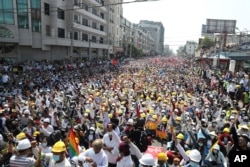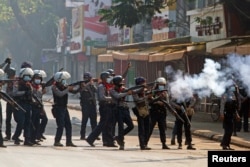A British rights group is taking Myanmar’s junta to court over allegations of widespread torture since a 2021 coup, frustrated by a perceived lack of meaningful action by the United Nations.
The Myanmar Accountability Project filed the criminal case with the Public Prosecutor’s Office in Istanbul, Turkey on March 29, pinning its hopes of holding the junta’s leaders to account on the legal principle of universal jurisdiction.
Universal jurisdiction holds that some crimes are so heinous they transcend any one nation and can be tried anywhere. International treaties in its remit include the U.N.-sponsored Convention Against Torture. Turkey is one of the signatories.
“Where there isn’t any other meaningful international action ... a state party to a convention has a particular obligation to act,” MAP director Chris Gunness told VOA.
“The [U.N.] Security Council sure as hell isn’t going to do anything about crimes against humanity being committed inside Myanmar. General Assembly resolutions ... are non-binding.”
A resolution condemning the junta’s bloody crackdown on peaceful protests against the Myanmar military’s February 2021 coup made it through the General Assembly in June. But China and Russia, the junta’s main arms suppliers, are widely seen to be blocking the Security Council from imposing international sanctions and any hope of referring Myanmar’s leaders to the International Criminal Court in The Hague.
“What this [case] does is provide a legal process in which there can be accountability,” said Gunness.
Myanmar is already on trial at the International Court of Justice in The Hague in a case brought by Gambia alleging genocide over the military’s treatment of ethnic minority Rohingya before last year’s coup. The military is also under investigation for the same alleged crimes, which it denies, in Argentina in another universal jurisdiction case filed there by a Rohingya rights group in 2019.
MAP says its case breaks new ground by taking Myanmar’s military to court in a foreign jurisdiction over alleged crimes committed since the coup that ousted the democratically elected government.
In a lengthy report issued last month, the U.N. accused the military of systematic human rights violations over the past year, some amounting to war crimes and crimes against humanity. It says security forces targeted civilians, with many shot in the head, burned to death, arbitrarily arrested or used as human shields and tortured.
The case for torture
Gunness said MAP chose to focus on torture due to the strength of the evidence backing it up, although he refused to discuss what that was for fear of exposing the alleged victims. He said the case focuses on one alleged victim’s time at a notorious interrogation center called Ye Kyi Ain but includes evidence of several other victims as well to prove that the junta’s practices amount to a crime against humanity.
He said the 24 accused include junta leader Min Aung Hlaing, military security chief Ye Win Oo, and the two men who run the interrogation center — Tun Tun Zan and Tun Nay Lin.
A spokesman for the military and junta leaders could not be reached for comment.
The military has denied committing atrocities since the coup and says it has a duty to ensure peace and security in the face of nationwide armed resistance to its rule.
Gunness said he considered filing the case in several countries but settled on Turkey for a number of reasons: popular sympathy for the plight of the Rohingya; support for last year’s U.N. General Assembly resolution; a track record of taking up universal jurisdiction cases; and its many extradition treaties with other countries.
Gunness said his hope is that some of the accused might be arrested while visiting or transiting through one of those countries and be extradited to Turkey to stand trial.
Short of that, he hopes the case can help further isolate the junta and keep it out of Myanmar’s U.N. seat. Kyaw Moe Tun, who was appointed before the coup, still holds the post and was quick to condemn the putsch. The junta has thus far failed in its bid to replace him.
“A state's democratic credentials and human rights record are increasingly important considerations at the U.N.'s Credentials Committee, which decides who sits in the General Assembly and other U.N. bodies,” Gunness said. “The fact that the junta is in the dock for torturing and murdering its own people on an industrial scale can only isolate Myanmar's military clique even further across the international system."
The Public Prosecutor’s Office in Istanbul has yet to announce whether it will take up the case. It did not reply to VOA’s requests for comment.
‘Better than nothing’
Whatever its chances, universal jurisdiction cases can offer an antidote to impunity when countries like Myanmar refuse to recognize the ICC and allies on the U.N. Security Council, like China and Russia, stand in the way of referring them there, said Linda Lakhdhir, Asia division legal adviser to Human Rights Watch, a U.S.-based rights group.
And even if the accused never end up in the dock, she said, “A jurisdiction like Turkey taking this case and hearing it does send a signal to Myanmar that their actions are being scrutinized and are considered worthy of this kind of scrutiny.”
Universal jurisdiction, in principle and in practice, has its critics.
In practice, it matters that the country taking up a case is seen to have honest courts, said Catherine Renshaw, who teaches international law at Australia’s Western Sydney University and studies Myanmar.
“The idea is that international justice proceedings should meet the highest levels of integrity and compliance with the rule of law, and that’s what the International Criminal Court tries to pursue, and it’s one of the reasons why there are such terrible delays with ICC proceedings. But those sorts of guarantees are really what the system relies on, and we can’t guarantee that they are in place in countries like Turkey,” she said.
Turkey’s government claims that its courts are on a par with the best in the world but is often accused at home and abroad of wielding them against its critics and political opponents.
Renshaw said victims may also see prosecutions abroad as poor substitutes for justice denied at home, especially when those who end up in a foreign court’s grasp are among the least responsible, as has happened with some universal jurisdiction cases.
Even if Turkey’s courts take up the case, she said the accused are not likely to end up there any time soon, and that the case might not shed much new light on the alleged torture without their testimony.
The Independent Investigative Mechanism for Myanmar, set up by the U.N. in 2018, is already at work collecting evidence of “the most serious international crimes” in the country from before the coup and since.
“The thing that universal jurisdiction is said to provide is a degree of justice, which is better than nothing, but I wonder if the victims really feel the same about it,” said Renshaw.
“The biggest worry that you have about it is that it raises the hopes of victims and people in Myanmar that there is justice afoot and the reality of that is a much paler sort of justice than what they might be anticipating.”









